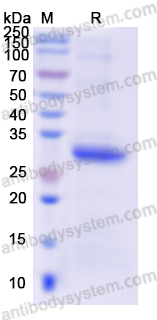Catalog No.
YHC06001
Expression system
E. coli
Species
Homo sapiens (Human)
Protein length
Asp18-Gly273
Predicted molecular weight
30.05 kDa
Nature
Recombinant
Endotoxin level
Please contact with the lab for this information.
Purity
>90% as determined by SDS-PAGE.
Accession
P04075
Applications
ELISA, Immunogen, SDS-PAGE, WB, Bioactivity testing in progress
Form
Lyophilized
Storage buffer
Lyophilized from a solution in PBS pH 7.4, 0.02% NLS, 1mM EDTA, 4% Trehalose, 1% Mannitol.
Reconstitution
Reconstitute in sterile water for a stock solution.
Shipping
In general, proteins are provided as lyophilized powder/frozen liquid. They are shipped out with dry ice/blue ice unless customers require otherwise.
Stability and Storage
Use a manual defrost freezer and avoid repeated freeze thaw cycles. Store at 2 to 8°C for frequent use. Store at -20 to -80°C for twelve months from the date of receipt.
Alternative Names
Fructose-bisphosphate aldolase A, ALDA, Muscle-type aldolase, Lung cancer antigen NY-LU-1, ALDOA
β-suppressor protein 1 (ARRB1)-△exon13 modulates the progression of glioblastoma via combination with glycolysis-related proteins., PMID:40486495
Jatrorrhizine Alleviates Calcific Aortic Valve Disease via Interfering With Glycolysis Targeting ALDOA K42 Lactylation., PMID:40485074
The interaction of HT-2 toxin and Akt1 on gene expression regulation in Kashin-Beck disease pathogenesis., PMID:40449756
A microbial amino-acid-conjugated bile acid, tryptophan-cholic acid, improves glucose homeostasis via the orphan receptor MRGPRE., PMID:40446798
Esculetin inhibits liver cancer by targeting glucose-6-phosphate isomerase mediated glycolysis., PMID:40373632
Cerebrospinal fluid proteome profiling across the Alzheimer's disease continuum: a step towards solving the equation for 'X'., PMID:40329321
Machine learning technique-based four-autoantibody test for early detection of esophageal squamous cell carcinoma: a multicenter, retrospective study with a nested case-control study., PMID:40264204
Mating Increases CHST10 Activity in Rat Oviductal Mucosa to Induce the Synthesis of HNK-1 Glycoproteins: Possible Role in Sperm-Oviduct Interactions., PMID:40244179
Comprehensive PTM profiling with SCASP-PTM uncovers mechanisms of p62 degradation and ALDOA-mediated tumor progression., PMID:40186868
Potential mechanism of dietary palm kernel meal effect on muscle tenderness in Tibetan sheep revealed by proteomics and phosphorylated proteomics., PMID:40068263
The effect of extracellular vesicles derived from oral squamous cell carcinoma on the metabolic profile of oral fibroblasts., PMID:40062228
Esketamine attenuates traumatic brain injury by modulating STAT3-mediated Glycolysis and immune responses., PMID:40055623
Exosomal lncRNA Mir100hg from lung cancer stem cells activates H3K14 lactylation to enhance metastatic activity in non-stem lung cancer cells., PMID:40022086
Aerobic exercise acts differentially on proteins from glucose and glycogen pathways in the SOL and PL muscles of offspring rats submitted to a low-protein maternal diet., PMID:39954356
Integration of metabolomics and transcriptomics reveals the mechanism of TMEM30A downregulation induced FSGS podocyte injury., PMID:39907744
A cellular model of TDP-43 induces phosphorylated TDP-43 aggregation with distinct changes in solubility and autophagy dysregulation., PMID:39887552
Cardiac ATP production and contractility are favorably regulated by short-term S100A9 blockade after myocardial infarction., PMID:39870300
Immune infiltration landscape and potential drug-targeted implications for hepatocellular carcinoma with 'progression/hyper-progression' recurrence., PMID:39865865
The multifaceted roles of aldolase A in cancer: glycolysis, cytoskeleton, translation and beyond., PMID:39808355
[Casticin inhibits proliferation of non-small cell lung cancer cells by regulating glucose metabolism through suppression of HIF-1α]., PMID:39805764
Genetic code expansion reveals site-specific lactylation in living cells reshapes protein functions., PMID:39779673
ALDOA contributes to colorectal tumorigenesis and metastasis by targeting YAP., PMID:39755705
The protein circPETH-147aa regulates metabolic reprogramming in hepatocellular carcinoma cells to remodel immunosuppressive microenvironment., PMID:39747873
Effects of moderate intensity exercise on liver metabolism in mice based on multi-omics analysis., PMID:39730655
ANGPTL4 mediated mesothelial-mesenchymal transition in pulmonary fibrosis: a potential therapeutic target., PMID:39707362
Casticin inhibits proliferation of Non-small cell lung cancer cells through regulating reprogramming of glucose metabolism., PMID:39647464
Fructose 1,6-bisphosphatase as a promising target of anticancer treatment., PMID:39490352
Lactyllysine Esterification Enables Efficient Lactylprotein Expression via Genetic Code Expansion and Supports Functional Proteomics Studies., PMID:39316072
Treatment resistance to melanoma therapeutics on a single cell level., PMID:39300183
The role of chromatin modulator DPY30 in glucose metabolism of colorectal cancer cells., PMID:39262496
LncRNA ACVR2B-as1 interacts with ALDOA to regulate the self-renewal and apoptosis of human spermatogonial stem cells by controlling glycolysis activity., PMID:39254854
Integrated multi-omic high-throughput strategies across-species identified potential key diagnostic, prognostic, and therapeutic targets for atherosclerosis under high glucose conditions., PMID:39223351
The Protective Effect of Quercetin against the Cytotoxicity Induced by Fumonisin B1 in Sertoli Cells., PMID:39201451
Alternative splicing of ALDOA confers tamoxifen resistance in breast cancer., PMID:39164523
Lactylome Analysis Unveils Lactylation-Dependent Mechanisms of Stemness Remodeling in the Liver Cancer Stem Cells., PMID:39099416
A pro-metastatic tRNA fragment drives aldolase A oligomerization to enhance aerobic glycolysis in lung adenocarcinoma., PMID:39058593
Reprogramming of Energy Metabolism in Human PKD1 Polycystic Kidney Disease: A Systems Biology Analysis., PMID:39000280
Identification of hub glycolysis-related genes in acute myocardial infarction and their correlation with immune infiltration using bioinformatics analysis., PMID:38987688
Proteomic analysis of Rana sylvatica reveals differentially expressed proteins in liver in response to anoxia, dehydration or freezing stress., PMID:38965296
Deciphering Early and Progressive Molecular Signatures in Alzheimer's Disease through Integrated Longitudinal Proteomic and Pathway Analysis in a Rodent Model., PMID:38928172
Scutellarin Protects against Myocardial Ischemia-reperfusion Injury by Enhancing Aerobic Glycolysis through miR-34c-5p/ALDOA Axis., PMID:38912363
Network pharmacology and molecular docking technology for exploring the effect and mechanism of high-dose vitamin c on ferroptosis of tumor cells: A review., PMID:38758839
Glucose starvation causes ferroptosis-mediated lysosomal dysfunction., PMID:38706843
[Clinical and molecular genetic analysis of a child with comorbid 16p11.2 microdeletion syndrome and Rett syndrome]., PMID:38684311
Bioinformatics and system biology approaches to determine the connection of SARS-CoV-2 infection and intrahepatic cholangiocarcinoma., PMID:38648205
Orphan Nuclear Receptor NR4A3 Promotes Vascular Calcification via Histone Lactylation., PMID:38629274
Constructing lactylation-related genes prognostic model to effectively predict the disease-free survival and treatment responsiveness in prostate cancer based on machine learning., PMID:38566813
Label-Free Quantitative Analysis of Pig Liver Proteome after Hepatitis E Virus Infection., PMID:38543773
Prognosis significance and potential association between ALDOA and AKT expression in colorectal cancer., PMID:38499636
ZNF692 drives malignant development of hepatocellular carcinoma cells by promoting ALDOA-dependent glycolysis., PMID:38453820

